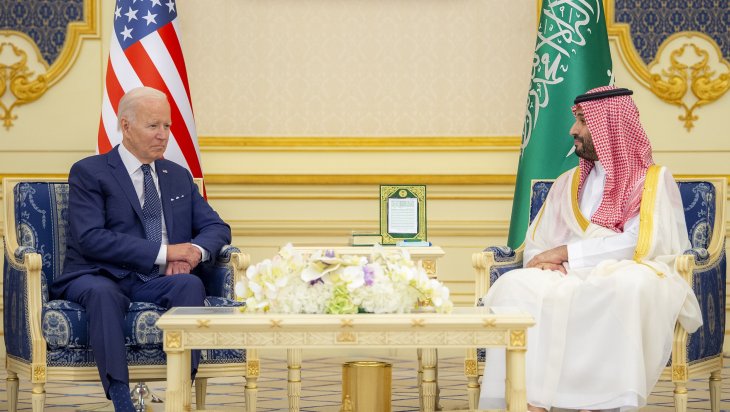US-Saudi relations: Resetting partnership in shifting landscape

Amid the persisting unresolved tensions between the United States and Saudi Arabia during the Joe Biden administration, the auspicious visit of U.S. Secretary of State Antony Blinken to the Kingdom of Saudi Arabia in June serves as a tangible manifestation of the U.S. ardent endeavor to rectify and mend the frayed fabric of bilateral relations. Tracing the footsteps of National Security Adviser Jake Sullivan, Blinken emerges as the second eminent American diplomat to embark on a voyage to Saudi Arabia within a remarkably condensed timeframe of less than a month.
The overarching objectives underpinning Blinken's purposeful sojourn to the Kingdom encompass a multifaceted ambit, predominantly including the assurance and preservation of regional security, the cultivation of collaborative mechanisms toward the resolution of intractable regional conflicts, the building and augmentation of economic interdependence, the harmonization of joint efforts to advance clean energy initiatives, and the facilitation of collaboration aimed at fostering educational cooperation. Nevertheless, it remains paramount to underscore the impetus behind this diplomatic overture, which emanates from the profound transformation pervading Saudi Arabia's foreign policy landscape.
3 catalysts behind U.S. policy shift toward Saudis
Throughout the tenure of the Biden administration, a confluence of intricate challenges encompassing the Jamal Khashoggi crisis, the Yemen crisis, divergent stances regarding the Iran Nuclear Deal, concerns pertaining to human rights conditions in Saudi Arabia, the evolving energy policy of the U.S., the Saudi sphere of influence in shaping diverse interpretations of Islam, incorporating conservative ideologies, and divergent approaches toward regional conflicts, collectively emerged as the primary loci of contention within the intricate tapestry of U.S.-Saudi relations. Nevertheless, amid this complex backdrop, three fundamental developments have engendered an imperative necessity for the U.S. to comprehensively recalibrate its engagement with Saudi Arabia.
The foremost development and concept necessitating a recalibration of U.S.-Saudi relations pertain to the process of de-Americanization and American disengagement, which has been unfolding over an extended period and witnessed varying degrees of momentum during the Barack Obama, Donald Trump and Biden administrations. However, the sudden and precipitous withdrawal of American forces from Afghanistan epitomized the U.S. disengagement from the region, consequently paving the way for the crystallization of the policy inclinations of U.S. allies in the region into tangible and proactive policy preferences. In light of this transformative shift, Gulf countries, including Saudi Arabia, have actively forged political, social, military and economic ties with Russia and China. A testament to this trend was Chinese President Xi Jinping's visit to Saudi Arabia, where he engaged in discussions with all the Gulf Cooperation Council (GCC) nations, simultaneously fostering political normalization between Saudi Arabia and Iran following the initial mediation efforts led by Iraq's former Prime Minister Mustafa al-Kadhimi.
Furthermore, the Russian-Ukraine War engendered a global energy supply crisis, with Mohammed bin Salman's close rapport with Russian President Putin within the framework of OPEC+ posing a significant challenge to the U.S. energy security plans. Against the backdrop of mounting global inflationary pressures and the looming specter of recession in the Western world, the U.S. was compelled to approach Saudi Arabia willingly. However, within this context, Saudi Arabia endeavored to cultivate robust relations with the BRICS organization, which stands as one of the staunchest advocates of the de-dollarization processes – a prevailing global trend. As such, Saudi Arabia has sought to elevate its relations with BRICS to a strategic level. While recent discussions surrounding Saudi Arabia's membership in BRICS have emerged, the Kingdom also participates in "The Friends of BRICS" meetings alongside other Gulf nations.
Why Saudis became important for U.S.
The fundamental reasons that underpin the enduring partnership between the U.S. and Saudi Arabia coincide with the factors that have recently necessitated a resetting of their relations. In this context, the imperative of ensuring energy supply security and the continued promotion of economic cooperation assume critical significance, motivating the U.S. to sustain this partnership. Furthermore, the shared commitment to counterterrorism policies, the mutual belief in fostering regional stability, collaboration in military endeavors, and the determination to address regional threats emerge as other crucial elements that strengthen the bond between the two countries. Moreover, Saudi Arabia's pivotal cultural and religious position in the Arab world, along with the joint humanitarian aid efforts in Sudan, and Yemen in recent times, serve as indicators of the indispensability of a reset in bilateral relations.
Nevertheless, the decisions to gradually curtail oil production within the framework of OPEC+ contribute to increased volatility in oil prices, thus undermining global economic predictability. Despite the U.S. engagement in intensive diplomatic efforts with Saudi Arabia, tangible outcomes in this regard have yet to materialize, and the integration of these efforts into the broader de-dollarization processes has not been formally endorsed by Saudi Arabia. Concurrently, the recent initiatives for political normalization between Saudi Arabia and Iran, orchestrated by China, reposition the U.S. within the ambit of the U.S.-China global rivalry, diminishing the perception of Iran as a regional threat while reducing Saudi Arabia's reliance on U.S. military equipment. Additionally, the presence of alternative major powers such as Russia, China and India in the Saudi market begins to erode the position of U.S. companies in Saudi Arabia, consequently impacting their global competitiveness.
These circumstances help elucidate the renewed U.S. interest in Saudi Arabia and the broader Gulf region. Blinken explicitly acknowledged this, emphasizing that the GCC lies at the nexus of the U.S. pursuit of stability and prosperity in the Middle East. Thus, one of the core implications and outcomes herein is that, in an era characterized by structural shifts in Middle Eastern alliances and the increased political, military, and economic influence of alternative powers in the region, the U.S. may yearn for a Middle East where unipolarity and unilateralism remain central tenets of its policy.
This article was published on DAILY SABAH on August 14, 2023, with the title “US-Saudi relations: Resetting partnership in shifting landscape”








